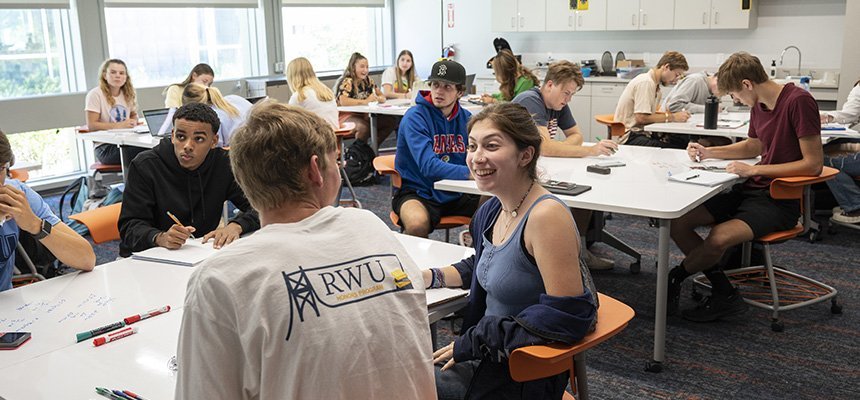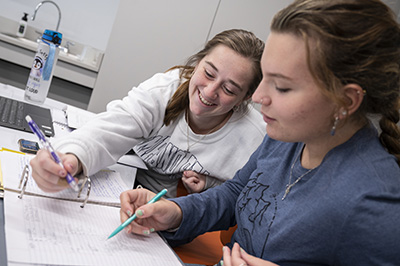
General Education
Our new skills-based and outcomes-focused General Education curriculum allows every student to graduate with a minor.
Personalized, Outcomes-Focused General Education
 Chart a course through the GenEd with academic advisors to create an experience that is uniquely your own. This ability to create your own powerful combination of courses is designed into the GenEd program.
Chart a course through the GenEd with academic advisors to create an experience that is uniquely your own. This ability to create your own powerful combination of courses is designed into the GenEd program.
The RWU GenEd does not require specific subjects to be taken (e.g., philosophy, history). Rather, it is designed around six academic themes: Writing, Creativity & The Arts, Global Perspectives, Systems Thinking, Social Inquiry, and Quantitative Inquiry. The six learning themes of our GenEd provide you with the top in-demand skills that will set you apart with employers across all industries.
Embedded Minor
A unique feature of the GenEd at RWU is the ability for you to complete one of 41 minors within the GenEd program requirements. An embedded minor allows RWU students, by design, to easily graduate with a major and a minor. You can combine your interests and stand out in the job search process.
Anthropology + Sociology Minor
Aquaculture and Aquarium Science Minor
Art and Architectural History Minor
Communication & Media Studies Minor
English Literary Studies Minor
Gender and Sexuality Studies Minor
Graphic Design Communication Minor
Latin American and Latino Studies Minor
Professional and Public Writing Minor
Visual Arts: Film, Animation and Video Minor
Visual Arts: Painting/Drawing/Printmaking Minor
Right-Sized
The RWU GenEd takes 40-43 credits to complete. And with a bachelor’s degree requiring 120 credits, GenEd represents just about one-third of the overall graduation requirements at RWU. This leaves lots of room to explore diverse interests, take risks, and complete a second major.
Flexibility & Choice
At some colleges, a “Core” curriculum requires all students to take the pre-defined set of courses. Alternatively, in a General Education approach, specific themes are required but a wider variety of courses can meet the requirement. The new RWU General Education (GenEd) program embraces this approach, giving you more choice in an open curriculum across all our schools of study.
Learning Themes
At RWU, students will take courses in each of the following themes:
| RWU Learning Theme | Outcomes Desired by Employers |
|---|---|
| Writing | Introduces students to the context of writing for academic, professional, and public audiences. Skills learned: Ability to form arguments and reason and communicate through the written word |
| Creativity & The Arts | Helps students appreciate the importance of the arts as forms of expression of culture, society, and the human condition. Skills learned: Creative thinking, design, and application of knowledge |
| Global Perspectives | Helps students understand the dynamics of global systems and appreciate our interconnectedness as engaged citizens of the world. Students will draw on historical and contemporary resources as well as marginalized narratives. Skills learned: Ability to communicate and work with people from different cultural backgrounds. |
| Systems Thinking | Teaches students how a diversity of perspectives is required for understanding relationships within a complex system. Skills learned: Ability to integrate ideas and information across settings and contexts. |
| Social Inquiry | Explores how people’s lives are connected to systems of politics, culture, and media through the humanities and other subject areas. Skills learned: Work effectively in teams; work with people from diverse cultural backgrounds; integrate ideas across contexts; grow and develop civic skills and engagement |
| Quantitative Inquiry | Hones students’ ability to work with numbers and statistics. They will learn critical thinking, problem solving, and effective communication and apply mathematical and statistical reasoning in both abstract and real-world problems. Skills learned: Ability to analyze and interpret data |


